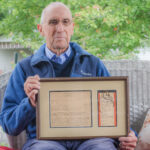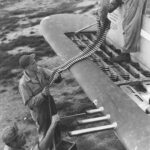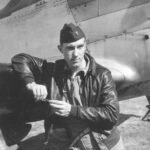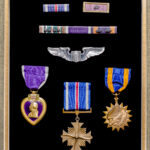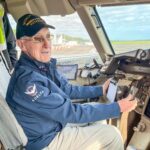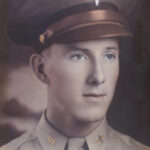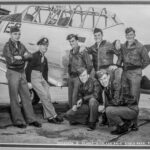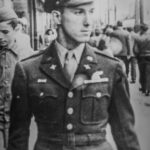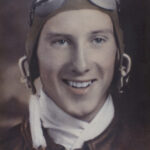Wally King was born October 31, 1923 in Cortland, Ohio. He grew up in that rural part of the Buckeye state, not too far from the Pennsylvania border. Wally recalls a pretty normal childhood, growing up against the backdrop of the 1920s and the Great Depression 1930s. His father had two sons from his first marriage (his wife had died in the flu epidemic after World War One), so Wally grew up alongside those stepbrothers as well as children from the second marriage. Wally’s father was able to remain employed during the 30s, and Wally remembers that they considered themselves “middle class” because of that. Wally and his friends made their own fun, playing baseball and exploring the countryside. He graduated high school in June 1941, and later that year on December 7 the Japanese attacked Pearl Harbor. Wally and his friends all expected to be in the service soon enough, but Wally – with an interest in aviation – held out for the US Army Air Corps. Wally was accepted there – and he went into a short holding pattern before beginning his training, which lasted about a year. He went through various bases across Mississippi, Florida, Kansas and Texas, flying a number of different aircraft as a newly minted cadet. He was selected to be a fighter pilot, and by 1944 he was aboard the Aquitania heading for Europe. In England the men were introduced to the P-51B Mustang fighter; by this time D-day had taken place, so Wally and the others were shipped to Normandy in short order, flying Mustangs out of airstrip 1A. That didn’t last though, and when that fighter group was disbanded Wally was shipped east and introduced to the P-47 Thunderbolt. He took one practice flight, and the next day he was on his first combat mission, flying as part of the 9th Air Force in its mission of tactical support of the ground war. He flew 75 such missions over the next year, most as part of the 406th Fighter Group. Many of these missions took place in December 1944, during the Battle of the Bulge, when Wally and his fellow pilots were tasked with supporting the 101st Airborne, which was trapped in Bastogne. The 406th would be transferred several more times, always in support of the advancing armies on the ground. They moved into Holland and Germany, and Wally recalls flying many missions in March 1945 in particular. On his 75th mission – which was to be his last – he was hit by enemy fire and forced to bail out. He was fired at as he was descending but on the ground he managed to evade those angry civilians for a few moments, but he was taken prisoner on the banks of the Elbe. As his wounds were being treated, German soldiers came to retrieve him. Wally expected that they would kill him, but a German officer intervened; Wally ended up being sent to a German medical unit not far from the Russian front. He was very fortunate in that regard: the German doctor there succeeded in returning Wally and the other soldiers in his care to the American perimeter, saving their lives. Wally went on to an extended recovery in American medical facilities in France, and eventually made his way back to Ohio, where he went back to work and then college, and family and career. Crestwood students were able to meet Wally via zoom on April 22, 2023.
Videos
Click next video below to keep watching
